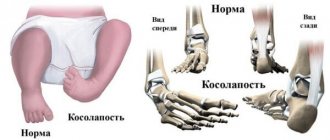Have you ever thought about how many times a day you yawn? Yawning is a very interesting process, but not fully understood. We yawn when we are bored, when we are tired, or when someone else is doing it. Everyone is accustomed to this phenomenon; it does not raise any questions. However, it is worth paying special attention to the frequent occurrence of yawning. It may signal a serious illness.
What about babies who open their mouths and wrinkle their noses so touchingly? In children, yawning is directly related to the state of the body. If a child yawns frequently, this indicates that something is wrong with him. In this article, you will learn in which cases you should panic and in which cases you should take preventive measures.
Why does a child sigh frequently and deeply? The main causes of lack of air
There can be many reasons that cause difficulty breathing in a baby.
The table contains the most common of them
Quincke's edema, as one of the types of allergies, is the most dangerous disease in this case. If a child begins to experience swelling of the skin, especially on the face, redness, and difficulty breathing, you need to call an ambulance immediately!
To make the wait easier, you can reduce the likelihood of exposure to the allergen, most often a food allergen, and cool the swollen areas with a cold, damp towel.
In addition to difficulty breathing, the following symptoms appear:
- Blue skin.
- Rare or rapid pulse
- Pain in the left side under the ribs or under the shoulder blade.
Causes and treatments
So, the child is one year old and is breathing heavily, what should you do?
Naturally, the specialist selects treatment depending on the reasons that caused the breathing pathology. If the baby’s condition does not cause serious concern at the moment, you need to make an appointment with a pediatrician. If the baby’s condition rapidly deteriorates and he cannot breathe normally, then you should call an ambulance.
If difficulty breathing is caused by a cold or acute respiratory viral infection, it is usually accompanied by nasal congestion, cough, sore throat and fever. It is necessary to call a doctor to confirm the diagnosis; before this, the child is given plenty of warm drinks and provided with bed rest. The doctor will prescribe treatment, and the difficulty in breathing will disappear as treatment progresses and other symptoms of the disease disappear.
What to do if a child has difficulty breathing and lacks air?
If there is an acute lack of air, you should urgently call an ambulance. In such situations, panic on the part of parents is contraindicated! Under no circumstances should the child be left alone and, if possible, provide first aid.
- If the child is already big, the confident support of parents will help, who should try to normalize the breathing rhythm with the help of breathing exercises.
- Cooling the body a little with a damp towel will also help take the edge off the process.
- A soothing massage can help restore breathing.
- If a child is choking, you should help him spit out the foreign object without making sudden reverse movements. It is best to place the baby stomach down on a hard surface and sharply slap him between the shoulder blades 2-3 times. It is unsafe to use other methods; if it doesn’t work, wait for the doctors.
- It is not recommended to lie down if you have difficulty breathing; it is better to take a reclining position.
- You should not allow your child to fall asleep or lose consciousness during an attack! You need to keep ammonia on hand.
- In case of allergies, it is necessary to immediately remove the possible allergen from the child, give an antihistamine, rinse the nose, and rinse the mouth.
It is important to remember that only correct comprehensive diagnostics will help the doctor make the correct diagnosis and prescribe the correct treatment.
If your child has breathing problems, be sure to consult a specialist!
Constant lack of air when inhaling: causes, diseases
Constant lack of air means having attacks at least once a day or more often. In addition to the above diseases, such attacks can occur with cervical and thoracic osteochondrosis, pinched nerves, etc.
If difficulty breathing has become chronic and you think that it is permanent, consult a doctor immediately, as self-diagnosis and subsequent treatment can end very badly.
If a constant shortage occurs in heart patients, check with your doctor about heart medications and take them during attacks.
Reasons for frequent sighs in a child
I didn't notice before. Three days ago she complained that she felt like she couldn’t breathe deeply. I didn’t complain in the following days. but I began to notice that I often took deep breaths.
During sleep, breathing is calm, only if you change the position of your body during sleep you can take a deep breath.
Active, cheerful. Has anyone come across what this could be? A cardiogram was done in June at a sanatorium - the norm.
How does yours explain this?
I repeat once again, before digging in the direction of VSD (as it turned out to be for me), be sure to comprehensively check the child’s health.
My daughter had this at an earlier age. This happens to me often (VSD is my friend and my emotionality is increased).
Calming lung + physical activity + rest from mental work + fewer new impressions and bright emotions. No stress, everything is calm and positive.
The same method was used to treat all nervous tics - and blinking, and twitching of the nose, and heckling, and noisy exhalations through the nose - whatever happened, there was only one treatment option. As I wrote above
I can’t relate it to stress and nervousness.
But I associate it with stooping. I went to a chiropractor once, he adjusted my vertebrae, and it helped for a while. But working at the computer, my back immediately starts to sink.
I also noticed that it was due to the weather. When it’s frosty outside, it’s hard to breathe, when it’s warm, everything is ok. In the summer I don’t remember this at all, but in the summer I don’t have much work.
That’s when the manual technician helped in the winter
Although it’s warm now, it’s hard for me, although 2 days ago everything was ok.
In general, I don’t know the exact reason.
I can only breathe normally through yawning. I yawn like this all day long.
I can’t find a place for myself, out of the blue a problem with sighs appeared, how to get rid of them.
1. calm down, nothing bad happened, it was not for nothing that I wrote to you about the back above. This happens to me when, let’s say, I’m sick and lie down for several days, there are almost no movements and “difficulty breathing” appears, it all comes from the spine. The second follows from this.
2. Definitely! doing something active - dancing, aerobics, it doesn’t matter what, it will also strengthen your nerves.
3. When it seems to her that she cannot breathe, she must hold her breath and not breathe as long as she can, and then breathe as usual, this relieves the discomfort.
I just didn’t have this, and I can’t imagine this condition for my eldest either.
Last night we were in a taxi, she sighed continuously, we got out and said let’s take a walk, I don’t have enough air.
Today she also sighs, she came home from a matinee at school, either sad or tired. I bite my tongue so as not to draw attention.
Tell me, if the pediatrician listened yesterday, it means the lungs are normal, if she didn’t say anything?
1. Pneumonia
2. Brochnial spasm, as a consequence of an allergic reaction.
To exclude them, you can do a blood test. Inflammation and allergization will definitely be reflected. To calm down, you can give up and forget about these options. By the way, show the normal result to the child and say that she is not sick with anything, she just needs more physical activity.
3. Scoliosis. She has it.
4. Nerves. It’s not very bad with this, she’s suspicious and anxious and so are you (I don’t want to offend you even once, I’m like that myself)) And in anxious mothers, children almost always inherit these traits.
Sedentary lifestyle. For me to do. I would buy a disc with some kind of gymnastics exercises and make me do it every day during the day or in the late afternoon. 15-20 minutes, no more needed. And I would definitely add dousing with cold water. Just pour yourself out of a basin or bucket in the morning. This is very beneficial for vascular tone and nerves.
You can, of course, go to a pulmonologist to calm down, but I suspect that the reason is still the back + nerves + adolescence.
Now she often takes deep breaths and says that there is not enough air when inhaling. Yesterday I went to bed and fell asleep calmly, breathing too, I counted my inhalations and exhalations to 20. At 4 o’clock I started tossing and turning and sighing even in my sleep. Girls, to be honest, I worked myself up a lot, thank you for the advice!
They donated blood and urine - the tests were normal.
They took an x-ray of the lungs - normal.
We take medications prescribed by a neurologist: Magne B6, Mexidol, Tenoten. The doctor actually prescribed Adaptol, but when she found out that we started taking Tenoten, she said take it instead of Adaptol. I read about adaptol, it’s a tranquilizer, but I don’t want to give it yet.
They did an ECG and showed moderate respiratory arrhythmia.
They did an echocardiogram and it was normal.
He still sighs, sometimes he says there is not enough air.
The sighs have been going on for a month now; I no longer have the strength to hear them. Girls, who has any thoughts?
That year we encountered the youngest. We checked everything, we even visited Bakulevka. my son was getting worse and worse. Then we accidentally ended up at the Morozov Neurology Center, checked everything, and prescribed medicine for us. On the 3rd day of taking it all stopped))
The child sighs often, has anyone experienced this?
Show comments
At first I thought maybe it would go away on its own, but she only began to sigh more often (2-3 times per minute). The kindergarten teacher has already noticed these sighs.
I want to ask if this has happened to anyone? What they were doing? Which doctor did you see? How were you treated?
In general, I’m very worried, please advise.
This happened to me as a child and still happens sometimes. As I understand it, this is something nervous, like a nervous tic (well, that is, obsessive actions, like people blink, for example, and then sigh). I’m not treating it in any way, I just know that if you distract yourself, it will go away.
So my husband reassures me, he says he, too, had all sorts of strange things in his childhood.
In general, she is, of course, an emotional young lady, impressionable and very big-booted.
The baby sighs often and deeply, he does not have enough air, and has shortness of breath. What to do about this, how dangerous is it, and how to improve the baby’s condition? What could be causing a child’s lack of air, what needs to be changed in their lifestyle, does it need to be treated, or will it go away on its own? Read the answers to these questions in our article.
Why does a child sigh frequently and deeply? The main causes of lack of air
There can be many reasons that cause difficulty breathing in a baby.
The table contains the most common of them
| Cause | Description |
| Allergies to wool, dust and other household items can cause shortness of breath and a similar unpleasant and even frightening sensation. Quincke's edema, as one of the types of allergies, is the most dangerous disease in this case. If a child begins to experience swelling of the skin, especially on the face, redness, and difficulty breathing, you need to call an ambulance immediately! To make the wait easier, you need to reduce the likelihood of exposure to an allergen , most often it is food grade, and cool the swollen areas with a cold, damp towel. | |
| Epilepsy | There are cases of manifestation of the first signs of epilepsy , which consist precisely in a feeling of lack of air. But this option is unlikely and occurs only together with other symptoms, for example, convulsions or numbness of the limbs. |
| Asthma can cause difficulty breathing. Most often, the disease is inherited . | |
| Thymus disease | Infants may often have breathing problems related to the thymus gland. Older children have thymus diseases, but less often. It is necessary to consult a therapist and exclude the possibility of this disease . |
| Heart diseases | Poor heart function can cause shortness of breath and shortness of breath in the baby. In addition to difficulty breathing, the following symptoms appear:
|
| Angina | The tonsils become inflamed and enlarged. Attacks of suffocation appear, breathing becomes difficult, and sometimes fingers and lips turn blue . |
| Gastrointestinal disease: gastritis | In addition to stiffness during breathing, it also manifests itself as pain in the abdominal area. The first is due to an increase in the volume of the stomach, the second is due to the release of a large volume of digestive juice . |
| Neurological abnormalities | Stress or emotional overload can cause a similar reaction in the body. Accompanied by restless sleep and increased hysteria . In addition, the child’s general “twitchiness” indicates that his nerves need rest. |
| Curvature of the spine, osteochondrosis | If a child has a curved spine, the airways or lungs may become compressed and not function properly. Osteochondrosis will cause pain in the back and thoracic region . |
| Lung diseases | The options are different, these include perinatal disorders and acquired lung diseases . For example, pulmonary embolism. Blood clots accumulate in the lungs and blockage with blood clots occurs. |
When is it necessary to see a doctor urgently?
Difficulty breathing can manifest itself in different ways.
If a child gasps for air and literally suffocates, calling an ambulance is the first thing parents should do.
As prescribed by your doctor, you will need to undergo examinations such as:
- Cardiogram.
- Spirography, that is, checking lung volume.
- Chest X-ray to rule out problems with the structure of the lungs.
- Perhaps a visit to an orthopedist to rule out serious problems with the spine.
- EEG to rule out epilepsy.
- Allergen tests.
How to alleviate the child's condition?
There are ways that can alleviate the child’s condition and help prevent drying out of the larynx and relieve spasms:
- humidification of indoor air using special devices;
- inhalation of warm, humidified air;
- inhalation with mineral water, soda or saline solution.
For inhalations, you can use aerosol and steam inhalers; in hospital settings, steam-oxygen tents. We remind you once again that inhalations can only be done after consulting a doctor.
What to do if a child has difficulty breathing and lacks air?
If there is an acute lack of air, you should urgently call an ambulance. In such situations, panic on the part of parents is contraindicated! Under no circumstances should the child be left alone and, if possible, provide first aid.
What will even out your breathing before the doctors arrive?
- If the child is already big, the confident support of parents will help, who should try to normalize the breathing rhythm with the help of breathing exercises.
- Cooling the body a little with a damp towel will also help take the edge off the process.
- A soothing massage can help restore breathing.
- If a child is choking, you should help him spit out the foreign object without making sudden reverse movements. It is best to place the baby stomach down on a hard surface and sharply slap him between the shoulder blades 2-3 times. It is unsafe to use other methods; if it doesn’t work, wait for the doctors.
- It is not recommended to lie down if you have difficulty breathing; it is better to take a reclining position.
- You should not allow your child to fall asleep or lose consciousness during an attack! You need to keep ammonia on hand.
- In case of allergies, it is necessary to immediately remove the possible allergen from the child, give an antihistamine, rinse the nose, and rinse the mouth.
It is important to remember that only correct comprehensive diagnostics will help the doctor make the correct diagnosis and prescribe the correct treatment.
If your child has breathing problems, be sure to consult a specialist!
- cerebral encephalopathy
Due to certain circumstances and a difficult birth, from the moment the baby was born, I have been worried about not overlooking some of his abnormalities. I know that, for example, brain encephalopathy is very difficult to diagnose in children. Mine is almost 5 months old now. Sometimes I notice that the child has difficulty falling asleep and is capricious for a long time before bed. and sometimes he cannot focus on any subject for a long time. What examination would you recommend to undergo to rule out encephalopathy, thank you! - hyperactive child
What to do with a hyperactive child? Doctor, advise me what to do, I no longer have the strength to take care of my third child. The birth was difficult, almost immediately after the second pregnancy. The third child was born premature, but has now more or less gained weight. And now he is almost a year old, there is literally not a minute of peace. He crawls, howls, if I don’t look at him or don’t work with him, he starts screaming, crying, banging his head on the floor ((We did soothing baths, massages, everything helps for a while. Is such hyperactivity a reason to prescribe special treatment? And it’s possible Is it possible to get by with home methods? thank you very much
Babies are born with the ability to yawn and take deep breaths. Already in the womb they demonstrate this skill after 11 weeks of fetal ripening. From birth, babies love to yawn after sleep, when they are very tired or decide to copy their mother’s action.
But if the baby breathes intermittently and yawns all the time, parents should be wary. Why does a child take a deep breath, what is the reason for strange behavior, and how to help a child when he is choking, you will find out in our article.
Taking deep breaths through your mouth provides your lungs with more oxygen. In the process of yawning, the facial muscles tense and then relax, blood circulation and brain activity are activated.
A deep breath relieves fatigue, stress, and psycho-emotional tension. In pathological conditions, frequent yawning is an alarming symptom. Informs the baby's parents about health problems or extreme fatigue.
Difficulty breathing, feeling as if there is not enough air or oxygen: first aid
If there is a person nearby who has an attack of lack of air, urgently open the windows, bring him and sit him by the window. Check to see if there were any injuries or anything getting inside. If possible, check for swelling. At the same time, call an ambulance and describe the situation over the phone; depending on the circumstances, doctors will adjust your actions.
If this is your relative or friend and this is not the first time the situation has arisen, you probably know that the patient has medications. Give medicine immediately to relieve symptoms.
Why does a child constantly sigh and yawn?
If a child sighs heavily and yawns deeply three to four times a minute in a short period of time, the mother needs to pay close attention to this fact. There are several reasons for the baby's strange behavior.
Neurological pathologies
Nervous children sleep poorly, throw daily tantrums at their parents, have difficulty making contact, and are easily excitable. With the help of deep breaths, the baby tries to relax the tense, tight muscles and calm down.
A child with such symptoms should be shown to a pediatrician. If the disease is detected in time, it is cured faster and more effectively. After examination, the neurologist may suspect the following disorders:
- Asthenoneurotic syndrome; The child is depressed, weak, and constantly tired. The cause of the pathological condition is stress. Asthenia can be intrauterine in nature or acquired during life.
- Nervous tic; Provokes yawning in moments of emotional stress, with severe fatigue. It goes away with adequate treatment at puberty.
- Hyperventilation syndrome; Ventilation of the lungs increases several times in 1–2 minutes. The person breathes at a rapid pace, but he does not have enough air. The pathology is classified as a psychoneurological type. The attack is provoked by stress, fear, allergic reactions, and malfunctions of internal organs. It is extremely rare in children.
On a note! In rare cases, frequent yawning is accompanied by epilepsy. Simultaneously with gasping for air, you can notice other symptoms of “falling sickness”: convulsions, numbness, attacks of rage, apathy.
Lack of oxygen in the blood
Hypoxia is typical for newborns, children under 4–5 years of age with a stuffy nose, adenoids, and older adults. The lack of oxygen can be explained by the following reasons:
- Increased heart rate. Heart rate increases for natural reasons or due to heart pathologies.
- Slow metabolic processes. A slowdown in metabolism occurs due to viscous blood; it needs to be thinned with medication, and you need to drink more fluids. Lack of microelements, vitamins, and lack of sleep also negatively affect the functioning of internal organs and systems; the body cannot cope with the load and reduces the speed of work.
- Nervous tension. Stress and unpleasant situations shake up the central nervous system. The system needs more oxygen to restart. Feelings of suffocation and dizziness may occur.
- Sudden hypothermia, overheating. At elevated or lower temperatures, the brain turns on the brakes. Oxygen moves through the cells, the blood more slowly. Hypoxia occurs. The man wants to sleep. Once thermoregulation is restored, oxygen levels stabilize.
Overwork
- Emotional or physical burnout syndrome. In simple words, the child is tired. Constantly lacks sleep. Chronic fatigue provokes yawning. Babies often sigh while awake because they have not slept at night due to colic, itching, diaper rash, hunger due to a lack of mother's milk.
- Static pose. If a baby sits in front of the TV, is frozen in one position with toys, or lies in a crib for a long time without his parents, he will yawn. The muscles become numb, oxygen does not circulate through the blood in a normal rhythm. The body needs physical activity.
- Monotone. Yawning, due to the same cycle of mechanical actions, occurs more often in adults. This is how the body signals the need to change the rhythm of work, shake yourself up, and rest.
Congenital and acquired physiological pathologies
The culprits of the obsessive state, frequent yawning and loud sighs are dysfunction of internal organs or temporary disruptions in their functioning.
- Diseases of the thymus gland. These are DiGeorge syndrome, hyperplasia, myasthenia gravis, tumors. Children with a congenital defect get tired quickly, become out of breath if they climb stairs, and suffer from ischemia and arrhythmias.
- Vegetovascular dystonia. The functioning of the autonomic nervous system is disrupted. The person sleeps poorly, feels pain in the heart area, and the body temperature is unstable. Another common symptom is STS (sad sigh syndrome). In patients with VSD, the functioning of the respiratory system is disrupted, and the person experiences short-term suffocation. All symptoms are part of the internal experience, the stress of the body.
- Ventilation failure. A child with this disorder experiences frequent shortness of breath. First during physical activity, then at rest. Newborns are diagnosed with pathology immediately after leaving the womb. The baby cannot breathe the first breath of oxygen on his own; resuscitation comes to the rescue. The cause of the disorders is prematurity and immaturity of the lungs.
- Asthma. It is more often diagnosed in children prone to allergies, with weak immunity, and who have had pneumonia at an early age. With asthma, temporary asphyxia and shortness of breath occur, and the rhythm of the lungs and bronchi is disrupted.
- Adenoids. The tonsils, enlarged three to four times, block the passage of air. The baby is forced to breathe through his mouth. Lack of oxygen provokes periodic deep sighs and coughing.
- Cardiac pathologies. Defects and heart failure in infants manifest themselves externally in the form of difficulty breathing, deep sighs with sounds.
Colds, viral diseases
ARVI, tonsillitis, pharyngitis cause cough, sore throat, and pain. During the acute course of the disease, the tonsils become inflamed and block the passage of air. The baby experiences mild suffocation and lack of oxygen. The child is forced to swallow it in large portions. Inhalation looks like a yawn.
Other reasons
- Allergies. Dust, wool, and products hazardous to children cause difficulty breathing and rhinitis. The most dangerous scenario is Quincke's edema. Severe shortness of breath, blue lips, panic, swelling of the skin of the face and limbs accompany the attack. You need to urgently call for medical help.
- Curvature of the spine, osteochondrosis. The irregular curvature of the spinal column puts pressure on the internal organs (lungs, bronchi). To breathe deeply, the baby sometimes raises his shoulders and straightens his back. Makes deep yawns and breaths. Scoliosis has a bad effect on sleep, the child constantly experiences pain in the back and legs, and gets tired quickly.
- Pain in the stomach, gastritis. The increased volume of the stomach prevents the respiratory organs from functioning fully. The child is breathing intermittently. May cough.
- Helminths. Cause extensive intoxication of the body. Coughing, sighing, and difficulty breathing are symptoms of an advanced stage of the disease.
- Recovery period after pneumonia, sore throat, pharyngitis, laryngitis. Rehabilitation after acute conditions takes 1–2 months. Infrequent sighs during this period are not a dangerous sign.
Note to parents! You should not hold back a yawn or sigh in moments of extreme fatigue. The brain is actively looking for a way to restore strength.
How often during the day does your child take deep breaths?
Poll Options are limited because JavaScript is disabled in your browser.











